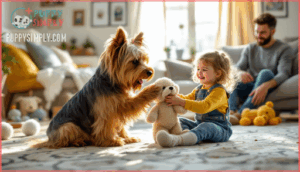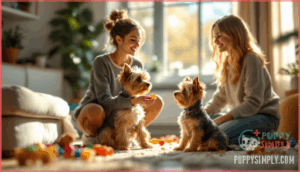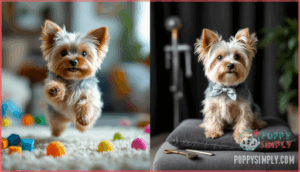This site is supported by our readers. We may earn a commission, at no cost to you, if you purchase through links.

Your pint-sized companion will greet the mailman like a guard dog, boss around dogs ten times their size, and curl up in your lap like they’ve found their true calling.
Understanding Yorkshire terrier temperament before you bring one home means you’ll be ready for the fierce loyalty, stubborn streak, and surprising boldness that comes standard with those silky coats.
Table Of Contents
- Key Takeaways
- Yorkshire Terrier Temperament and Personality
- Daily Life With a Yorkie
- Socialization and Training Insights
- Health and Grooming Considerations
- Pros and Cons of Owning a Yorkshire Terrier
- Frequently Asked Questions (FAQs)
- How often should you brush and bathe a Yorkshire Terrier’s coat?
- Can Yorkshire Terriers be left alone during the day while you are at work?
- Do Yorkies get along with other pets?
- How much do Yorkshire Terriers shed?
- Can Yorkies be left alone during work?
- Whats the ideal diet for a Yorkie?
- Are Yorkshire Terriers hypoallergenic dogs?
- Conclusion
Key Takeaways
- Yorkies pack bold, stubborn personalities into tiny frames—they’ll boss around dogs ten times their size and test your patience constantly, so expect training resistance in about 60% of the breed.
- These dogs thrive in apartments and fit busy schedules with just two short daily walks, but they demand daily brushing, regular dental care, and cost $18,000–$25,000 over their 12–15 year lifespan.
- Early socialization between 3 and 12 weeks cuts territorial aggression by 55% and persistent barking by 60%, making the critical puppy period non-negotiable for shaping lifelong temperament.
- Yorkies develop serious health issues like hypoglycemia in puppies and dental disease affecting nearly all adults, so preventative veterinary care and consistent grooming aren’t optional—they’re essential for quality of life.
Yorkshire Terrier Temperament and Personality
If you’re thinking about bringing a Yorkie into your life, you’ll want to know what makes them tick. These tiny dogs pack a whole lot of personality into a pint-sized package, and understanding their temperament upfront helps you know what to expect.
Let’s break down the key traits that define what it’s really like to own one of these spirited little companions.
Lively, Inquisitive, and Affectionate
Your Yorkie will greet you like you’ve been gone for years—even if you just stepped out to grab the mail—because these little dogs practically run on affection and curiosity. That playful energy and inquisitive nature mean you’ll find your pup investigating every corner of your home, building a loyal bond through their affectionate companionship.
This Yorkshire Terrier temperament creates an active family interaction where your dog’s personality shines through constant interaction and affectionate dog actions.
Boldness and Terrier Tenacity
Behind that adorable face and pocket-sized frame, you’ll discover a dog with the heart of a lion and the confidence of a canine twice its size. That Yorkshire Terrier temperament showcases a fearless nature and hunting instincts bred into these terrier breeds over generations, giving your pup a courageous edge you won’t expect.
Yorkshire Terriers pack a fearless lion’s heart into a pocket-sized frame, combining hunting instincts with a confidence that defies their delicate size
Your Yorkie’s confident demeanor means:
- Confronting dogs three times their size without hesitation
- Chasing squirrels with the determination of a seasoned hunter
- Standing guard at the door with fierce protective actions
- Defending their favorite toy like it’s buried treasure
Potential for Stubbornness and Bossiness
That fearless spirit can turn into a bossy streak faster than you can say "sit," especially if your Yorkie figures out they’re running the show instead of you. Training resistance shows up in about 60% of Yorkies, and this willful Yorkshire Terrier temperament and personality demands consistent discipline from day one.
Without clear leadership dynamics, your pint-sized companion will happily appoint themselves household CEO, making dog training challenges part of your daily routine.
Common Behavioral Challenges (Barking, Chewing)
When your Yorkie decides the mailman is enemy number one or transforms your favorite shoes into a chew toy, you’re dealing with the two biggest dog conduct challenges in this breed. Barking triggers include everything from doorbell rings to birds outside, and about half of all Yorkies bark frequently enough to frustrate owners.
Chewing solutions start with proper mental stimulation and safe chew toys, since anxiety issues like separation distress affect 18% of Yorkies and intensify both barking and destructive habits. A common symptom includes excessive barking when left alone.
Training strategies using positive reinforcement work best when you tackle the root cause—whether it’s boredom, anxiety, or their watchdog instincts kicking into overdrive.
Daily Life With a Yorkie
So what’s it actually like sharing your home with a Yorkie day in and day out? These tiny dogs pack a lot of personality into their 3-kilogram frames, and they’ll shape your daily routine in ways you mightn’t expect.
Let’s walk through what a typical day looks like when you’ve got one of these feisty little companions by your side.
Adapting to Apartment Living
If you’re living in a cozy apartment and wondering whether a Yorkie will turn your space into chaos or fit right in, you’ll be relieved to know these pint-sized pups were practically made for smaller homes.
Yorkshire Terriers adapt beautifully to apartment living thanks to their tiny footprint and moderate exercise needs. You won’t need a yard—just short daily walks and indoor enrichment like puzzle toys keep them happy.
Noise management can be tricky since Yorkies bark frequently, but consistent dog training with positive reinforcement helps maintain good neighbor relations.
Yorkies as Family Companions
When you picture a Yorkshire Terrier, you might imagine a lap dog who’s happy to lounge around all day—but the reality is, these spunky little companions bring a whole lot more energy and personality into family life than their size suggests.
Yorkies thrive as family pets when you match their activity levels with consistent play and walks. Their affectionate dog nature means they’ll bond closely with you, offering emotional support and loyalty.
Just watch interactions with young children—these tiny terriers can be fragile—and introduce them carefully in multi-pet homes since their bold Yorkshire Terrier temperament sometimes clashes with larger animals.
Suitability for First-Time Dog Owners
You’ll find Yorkshire Terriers ranking among the top choices for first-time dog owners—accounting for 30% of recent UK breed registrations—thanks to their ease of management at 4 to 7 pounds. However, Yorkshire Terrier temperament and personality bring training difficulty, grooming commitment, and expense considerations that test your lifestyle compatibility.
These small dogs need regular dental care to prevent health issues. Dog ownership experience with Yorkies demands patience during potty training, consistency guiding Yorkshire Terrier conduct, and understanding Yorkshire Terrier relationships require daily attention for these emotionally rewarding companions.
Handling Yorkie Energy Indoors and Outdoors
Your Yorkie’s energy doesn’t disappear when you step inside—it just shifts gears, turning your living room into a miniature obstacle course if you don’t channel it wisely. Indoor exercise like tug-of-war and puzzle toys provides mental stimulation between walks, while outdoor safety means watching for larger dogs and cold weather during playtime activities.
Understanding your Yorkshire Terrier’s energy levels helps you balance their temperament—they need both physical exercise and engaging tasks to keep dog conduct happy and manageable.
Socialization and Training Insights
Training a Yorkie takes patience and know-how, especially if you want to avoid behavioral headaches down the road. Getting socialization and training right from the start makes all the difference in how your dog approaches new people, pets, and situations.
Let’s look at what works—and what doesn’t—when you’re shaping your Yorkie’s temperament.
Importance of Early Socialization
The socialization window between 3 and 12 weeks is make-or-break for your Yorkie’s temperament and personality. During this critical period, positive experiences shape lifelong conduct—proper socialization cuts territorial aggression by 55% and persistent barking by 60%.
Start puppy classes at 8 weeks, expose your pup to new people, pets, and environments daily, and use treats and praise generously.
Insufficient socialization doubles the risk of overprotective conduct and increases separation anxiety by 67%, affecting long-term benefits like adaptability and confidence.
Training Challenges and Tips
Training a Yorkie isn’t rocket science, but it does require more patience than you’d expect from a dog that fits in your handbag. Stubbornness solutions and Yorkie training tips center on consistency—these little dogs test boundaries constantly.
Dog conduct challenges you’ll tackle include:
- Potty training mishaps from tiny bladders
- Barking control when they guard their territory
- Leash manners as they pull toward every distraction
- Recall training battles with their independent streak
Positive reinforcement wins over force every time with dog training for this breed.
Positive Reinforcement Strategies
Treats, praise, and perfect timing turn your Yorkie’s stubbornness into cooperation faster than any scolding ever will. Keep treat rewards tiny—pea-sized bits work best for shaping actions without overfeeding.
Clicker training marks exact moments your Yorkie gets it right, while toy motivation can seal the deal when food doesn’t cut it.
Praise timing matters most: celebrate good dog action within two seconds or you’ll confuse what you’re rewarding.
Managing Territorial or Fearful Behaviors
Even with great rewards in place, some Yorkies still snap at strangers or guard their favorite chair like it’s the last lifeboat on the Titanic. Fear aggression and resource guarding stem from anxiety triggers you can ease through confidence-building exercises:
- Gradual desensitization to reactivity training scenarios reduces Yorkshire Terrier conduct problems
- Calm introductions with strangers prevent Yorkie aggression issues before they escalate
- Trade-up games teach your dog that sharing beats hoarding every time
- Consistent routines minimize dog separation anxiety and other dog challenges
Health and Grooming Considerations
Owning a Yorkie means you’re signing up for more than just cuddles and playtime. These tiny dogs come with specific health risks and grooming demands that you’ll need to manage throughout their lives.
Let’s walk through what you can expect on the health and maintenance front.
Common Health Issues (Hypoglycemia, Dental Disease)
Despite being mighty in spirit, Yorkies face some breed-specific health challenges you’ll want to watch for. Hypoglycemia is particularly serious in puppies under four months, when their tiny bodies struggle to regulate blood sugar during stress or fasting. Apply honey to their gums if they seem weak or wobbly—it’s a lifesaver.
Dental disease is even more widespread, affecting nearly all Yorkies by adulthood. Daily brushing and annual cleanings aren’t optional extras; they’re essential for preventing painful infections that can steal your pup’s quality of life.
| Health Issue | What You Need to Know |
|---|---|
| Yorkie Hypoglycemia | Most common in puppies; feed small, frequent meals with protein |
| Emergency Responses | Rub honey or corn syrup on gums immediately if symptoms appear |
| Dental Disease Prevention | Brush teeth daily with dog toothpaste; schedule yearly cleanings |
| Genetic Predisposition | Yorkies carry higher diabetes and liver shunt risks than most breeds |
| Long-Term Management | Monitor glucose levels, maintain dental routines, reduce stress triggers |
Essential Grooming Needs and Routines
Keeping that silky coat in show-stopping condition takes more commitment than most new owners expect, but it’s honestly worth it when your Yorkie looks like they just walked out of a salon every day.
Here’s your Yorkshire Terrier grooming guide for essential coat maintenance:
- Daily brushing prevents tangles and keeps that signature shine—skip a day and you’ll spend an hour detangling mats
- Bathe every 3-4 weeks using dog-specific shampoo to maintain coat health without stripping natural oils
- Trim nails monthly since Yorkies rarely wear them down naturally from indoor living
- Brush teeth daily for dental hygiene—professional grooming visits every 6-8 weeks round out your pet grooming routine
Protecting Against Cold Weather
That gorgeous coat won’t keep your tiny companion warm when temperatures drop, so you’ll need to step in with some cold-weather strategies. Invest in quality dog coats for walks—small breed dogs like Yorkshire Terriers face real hypothermia risks below 45°F.
Keep indoor heating consistent, protect those delicate paws from ice and salt with booties, and watch senior Yorkies extra carefully since they’re more vulnerable to temperature extremes.
Regular Veterinary Care
Your Yorkie’s health depends on consistent veterinary visits—at least once a year for adults, and more frequently for puppies and seniors who need extra monitoring. These checkups catch common Yorkie health problems early—dental cleanings prevent tooth loss, vaccination schedules keep immunity strong, and preventative medications ward off parasites.
Your veterinarian becomes your partner in senior care planning, and pet insurance helps cushion unexpected emergency care costs when your little one needs it most.
Pros and Cons of Owning a Yorkshire Terrier
Before you commit to a Yorkie, it helps to weigh what you’re signing up for. These little dogs bring plenty of joy, but they also come with real responsibilities you’ll need to manage. Let’s break down the upsides and challenges so you know exactly what ownership looks like.
Advantages of The Breed
If you’re wondering whether a Yorkshire Terrier might be right for you, let’s talk about what makes these pint-sized pups so appealing to thousands of dog owners. Their apartment-friendly size means you don’t need a backyard, and their low exercise needs—just two short walks daily—fit busy schedules.
They’re affectionate companions with minimal shedding, a long lifespan of 12 to 15 years, and adaptable characteristics that make them excellent family companions, even for first-time owners.
Potential Drawbacks and Owner Responsibilities
Before you fall head over heels for those big brown eyes, let’s be real about the not-so-glamorous side of Yorkie ownership. You’re signing up for:
- Daily grooming sessions to prevent tangles and mats in that beautiful coat
- Managing barking and stubbornness during training—60% of Yorkies test your patience
- Monitoring health concerns like dental disease and hypoglycemia
The financial commitment, time investment, and training difficulties require consistent effort. These dog conduct challenges, especially anxiety and territorial reactions, demand dedication you can’t skip.
Long-Term Commitment and Costs
Owning a Yorkie means planning for a 12-to-15-year journey that’ll cost around $18,000 to $25,000. Yorkshire Terrier costs include more than just food—you’re looking at grooming, veterinary care, and those curveballs life throws. Pet expenses add up fast, so dog breed insurance (around $25-$50 monthly) helps cushion unexpected costs. Senior care gets pricier as your pup ages, making budgeting tips essential from day one. Understanding your Yorkie’s breed-specific needs and behavior traits helps you anticipate costs and plan better, which you can explore through comprehensive canine care guides that break down breed characteristics and health requirements.
| Expense Category | Annual Cost | Lifetime Total |
|---|---|---|
| Food & Treats | $50–$120 | $600–$1,800 |
| Grooming | $240–$600 | $2,880–$9,000 |
| Veterinary Care | $195–$510 | $2,340–$7,650 |
| Insurance Options | $300–$600 | $3,600–$9,000 |
Tips for a Happy, Healthy Yorkie
A happy Yorkie isn’t rocket science, but it does take some daily habits and a bit of foresight to keep that feisty little spark alive. Here’s your game plan:
- Mental Stimulation and Exercise Balance: Short walks twice daily plus puzzle toys prevent boredom-induced Yorkie actions and training issues.
- Preventative Care and Grooming Habits: Daily brushing and regular vet visits catch Yorkie health issues early, protecting that signature Yorkshire Terrier temperament and personality.
- Diet Choices: Quality nutrition prevents hypoglycemia and addresses Yorkie diet and nutrition needs while maintaining Yorkie training and socialization energy.
Frequently Asked Questions (FAQs)
How often should you brush and bathe a Yorkshire Terrier’s coat?
Long, silky Yorkshire Terrier coats need daily brushing to prevent tangles.
Bathing frequency depends on your Yorkie’s lifestyle—most need a bath every three to four weeks using gentle grooming products, followed by proper drying methods to maintain coat texture and health.
Can Yorkshire Terriers be left alone during the day while you are at work?
Most Yorkies can tolerate 4–6 hours alone with proper preparation, but they’re prone to separation anxiety if left longer.
Set up a safe space, stick to routines, provide boredom solutions like puzzle toys, and consider a dog walker for extended workdays to prevent destructive dog actions.
Do Yorkies get along with other pets?
Regarding getting along with other pets, it’s not exactly paws-itively automatic. With proper dog socialization and supervised interactions from puppyhood, Yorkies can adjust to multi-dog homes and even Yorkie-cat dynamics, though their terrier tenacity means controlled introductions are essential.
How much do Yorkshire Terriers shed?
Here’s some good news: Yorkies are low shedding dogs with a hypoallergenic coat that makes them suitable for allergy-friendly dogs lists. Their hair-like coat type means minimal seasonal shedding, though regular grooming is needed, including daily brushing to prevent tangles.
Can Yorkies be left alone during work?
Most Yorkies can tolerate four to six hours alone, but separation anxiety is common in the breed. Gradual acclimation with interactive toys and a safe environment helps prevent loneliness indicators like excessive barking or destructive chewing.
Whats the ideal diet for a Yorkie?
Feed your Yorkie high-quality dog food formulated for small breeds, providing nutritionally balanced portions that match their life stage—puppy diet for growth, senior diet for aging needs.
Watch for food allergies and consider mixing wet and dry food for variety.
Are Yorkshire Terriers hypoallergenic dogs?
Yorkshire Terriers aren’t truly hypoallergenic. While their hair-like coats shed minimally, they still produce dander and saliva allergens that trigger reactions in allergy-prone people.
Their breed hypoallergenicity is lower than marketed, requiring consistent grooming and allergy management strategies for sensitive owners.
Conclusion
A Yorkie is like a small package that explodes with personality the moment you open it. Understanding Yorkshire Terrier temperament means accepting that your tiny companion will demand attention, challenge your patience, and occasionally outsmart you.
But here’s the truth: that fierce loyalty and spirited nature aren’t bugs—they’re features. With proper training, socialization, and commitment to their grooming and health needs, these four-pound dynamos become irreplaceable family members.
You’re not just getting a dog; you’re getting a bold, affectionate partner who’ll keep life interesting.
- https://www.pets4homes.co.uk/pet-advice/ten-things-you-need-to-know-about-the-yorkshire-terrier-before-you-buy-one.html
- https://www.napo.pet/blog/everything-you-need-to-know-about-yorkshire-terriers
- https://www.yorkieinfocenter.com/yorkie-temperament-behavior
- https://lyka.com.au/blog/yorkshire-terrier-breed-guide
- https://dogtrainernewhampshire.com/the-ultimate-guide-to-socializing-your-yorkshire-terrier/













